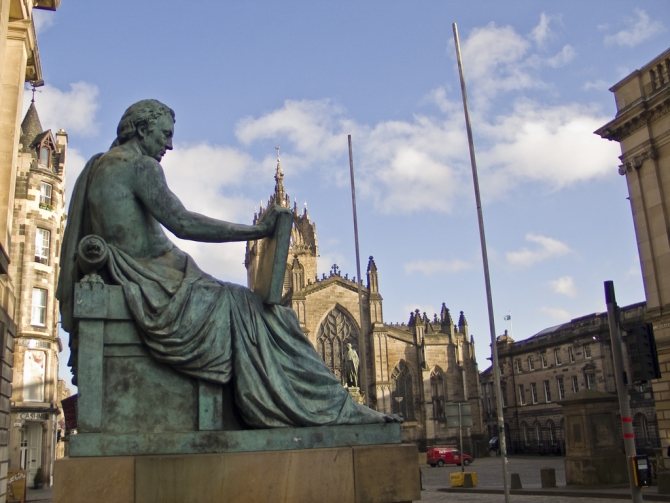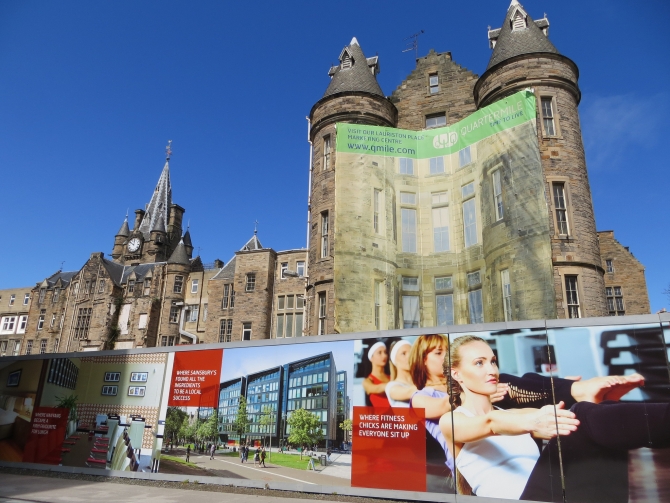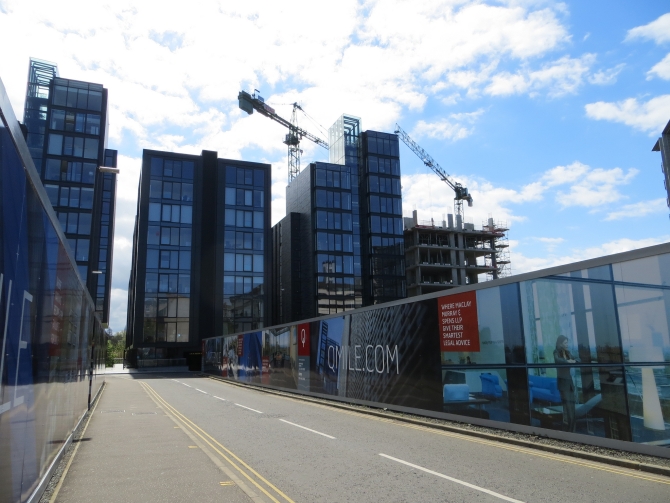The demolition of a 1950s Edinburgh office block — ignored by thousands of passers-by — has attracted the attention of historians after claims that a 200-year-old wine cellar belonging to one of Scotland’s most prominent thinkers may well be intact below the rubble.

Sixty years ago the former home of 18th century philosopher David Hume, which stood at 8 South St David’s Street was bulldozed to make way for an office development. That building, which had stood empty for five years, is now being replaced by a £75m ground floor shopping mall scheme with offices and apartments above.
It is while the initial groundwork is underway that city historian Mike Turnbull hopes to find some trace of Humes’ former abode — and especially his well-stocked and legendary wine cellar.
“There is a chance a surviving cellar might be intact underneath the pavement because they were made to extend out under the street,” explained Turnbull. “Hume was one of the first people to buy a property in Edinburgh’s New Town and spent the last few years of his life there, wining and dining the great and the good.”
Hume, who also prided himself on being an accomplished chef, held his last dinner party just a few weeks before he died on 4 July, 1776. A plaque celebrating his residence was erected on the 1950s building, used by Scottish Provident Insurance as its headquarters, but that has also disappeared.
“I don’t know if the new developers are aware of the Hume connection, but if it’s going to be a commercial property, perhaps they could find room for some sort of display inside,” suggested the historian. “It would be an asset and an attraction to the building.”
His call has received backing from conservation architect James Simpson, a distant relative of the Scottish philosopher. “If there is any evidence of foundations or cellars belonging to David Hume’s house, they should be investigated and preserved,” he said. “And if there is any trace of his wine cellar — even a surviving bottle of wine — that would be fantastic.”
The new mixed-use development at 3-8 St Andrews Square is being financed by a Standard Life Property Fund joint venture with Peveril Securities. Due for completion late in 2016, the scheme will create 105,000sq ft of Grade A offices and 85,000sq ft of retail units and apartments.
A spokesman for the developers said he was unaware of the site’s connection with David Hume, nor did he think there was any “active search” for evidence of his former home.
Meanwhile,one of Scotland’s biggest speculative funding deals has been struck to allow the completion of an Edinburgh development project. The £80m finance package is being used to build two office blocks as part of the city centre Quartermile scheme.

The agreement — between Quartermile owners Moorfield Real Estate and M&G Real Estate, the investment arm of insurer Prudential — will also see the first construction of speculative Grade A offices in the Scottish capital for more than 10 years. When occupied the twin buildings will provide work space for at least 2,000 people.
With the residential element at Quartermile already underway, a start on the seven-storey Quartermile 4 office building is expected within weeks. Completion is slated for early 2016, and would put 130,600sq ft of office and 12,490sq ft of retail space onto the market. Development of the six-storey 72,991sq ft Quartermile 3 office block would follow soon after.
“We are already attracting interest from prospective office occupiers keen to join the likes of legal heavyweight Maclay Murray & Spens and flight search firm Skyscanner at the site,” said Quartermile managing director Paul Curran. “This deal is excellent news for both Quartermile and Edinburgh.”
John Fyfield is M&G Real Estate’s director of development. “At a time when there is a real lack of Grade A office space in Edinburgh, the commitment to speculatively develop these buildings ensures they will be delivered into a market when there is little competition,” he said.
Master planned by Foster and Partners, the Quartermile project is being built on the site of the city’s old Royal Infirmary and was designed to integrate the surrounding 18th century buildings with the new-build additions. It’s progress has not been smooth.

The site was originally sold by the Lothian University Hospitals Trust in 2001 to a joint venture between the Bank of Scotland, Taylor Woodrow and Kilmartin Property Group for about £35m. Outline plans were drawn up but the 2008 property crash halted construction. Previously Gladedale Capital — owned by the Dunfermline-based house builder Avant Homes — had paid £200m for Taylor Woodrow’s 50 per cent stake in the scheme, while Kilmartin fell into administration in 2010. Eight years after acquiring its share of the joint venture Gladedale last year sold the site to property investor Moorfield.
After its property crash stall the entire project is expected to be completed by 2018. Once finished Quartermile will feature 900 flats, of which more than 560 have already been sold. The project will also include a total of more than 323,000sq ft of offices and 108,000sq ft of shops and leisure space.
“This is a very exciting time for investment in the capital and the speculative development of this Grade A office space at Quartermile is a vote of confidence in Edinburgh’s business sector,” commented city council economic convener Frank Ross.
“The fact that this office space is being built speculatively, without a pre-agreed tenant, supports our belief that there is a big demand for premium office space bubbling away beneath the surface and which will materialise next year or the year after,” he added. “I think the developers are ahead of the curve and are building at exactly the right time.”